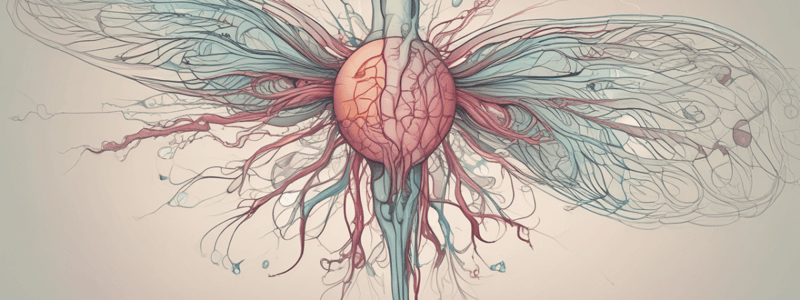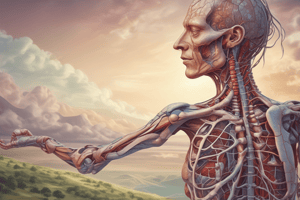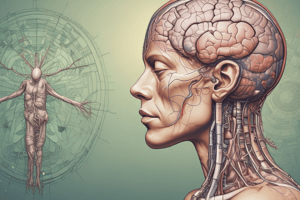Podcast
Questions and Answers
Which of the following is NOT a clinical feature of Addison's disease?
Which of the following is NOT a clinical feature of Addison's disease?
- Weight gain (correct)
- Hyperpigmentation
- Gastrointestinal symptoms
- Hypotension
Which diagnostic procedure involves administering 2mg of dexamethasone orally every six hours for 2 days?
Which diagnostic procedure involves administering 2mg of dexamethasone orally every six hours for 2 days?
- 24hr urine for cortisol
- High-dose dexamethasone suppression test (correct)
- Serum electrolyte test
- Plasma ACTH measurement
What does a high plasma ACTH level indicate?
What does a high plasma ACTH level indicate?
- Secondary Adrenocortical Insufficiency (Sheehan's syndrome)
- Primary Adrenocortical Insufficiency (Addison's disease) (correct)
- Congenital Adrenal Hyperplasia
- Cushing's disease
Which of the following is NOT an aetiology of Addison's disease?
Which of the following is NOT an aetiology of Addison's disease?
Which of these is a symptom of Cushing's syndrome?
Which of these is a symptom of Cushing's syndrome?
Which test is used to diagnose Cushing's disease by measuring cortisol in urine?
Which test is used to diagnose Cushing's disease by measuring cortisol in urine?
What is the main hormone produced by the zona glomerulosa?
What is the main hormone produced by the zona glomerulosa?
Which part of the adrenal gland secretes epinephrine?
Which part of the adrenal gland secretes epinephrine?
Which of the following stimulates the zona fasciculata to secrete its hormones?
Which of the following stimulates the zona fasciculata to secrete its hormones?
Which hormone contributes to libido and is a source of estrogen after menopause?
Which hormone contributes to libido and is a source of estrogen after menopause?
Which hormone is mainly responsible for increasing blood levels of sodium and water?
Which hormone is mainly responsible for increasing blood levels of sodium and water?
What is the primary function of glucocorticoids?
What is the primary function of glucocorticoids?
Which structure is responsible for secreting catecholamines?
Which structure is responsible for secreting catecholamines?
What is the role of mineralocorticoids in the body?
What is the role of mineralocorticoids in the body?
Which zone of the adrenal cortex secretes androgens?
Which zone of the adrenal cortex secretes androgens?
Which gland is anatomically closest to the adrenal gland?
Which gland is anatomically closest to the adrenal gland?
Which hormone regulates blood volume, blood pressure, and levels of sodium, potassium, and hydrogenate in the blood?
Which hormone regulates blood volume, blood pressure, and levels of sodium, potassium, and hydrogenate in the blood?
What enzyme is involved in the conversion of cholesterol to pregnenolone?
What enzyme is involved in the conversion of cholesterol to pregnenolone?
What is the role of CRH in the hypothalamic-pituitary-adrenal axis?
What is the role of CRH in the hypothalamic-pituitary-adrenal axis?
Which of the following is NOT a precursor to estrogen in adrenal and gonadal steroidogenesis?
Which of the following is NOT a precursor to estrogen in adrenal and gonadal steroidogenesis?
Which condition is characterized by primary hypercortisolaemia?
Which condition is characterized by primary hypercortisolaemia?
Which phase of hypocortisolaemia involves both glucocorticoid and mineralocorticoid deficiency?
Which phase of hypocortisolaemia involves both glucocorticoid and mineralocorticoid deficiency?
Which hormone stimulates the synthesis of cortisol and other corticosteroids?
Which hormone stimulates the synthesis of cortisol and other corticosteroids?
What is the impact of increased ACTH levels on the body?
What is the impact of increased ACTH levels on the body?
Study Notes
Adrenal Gland Structure and Function
- The adrenal gland has two main parts: the suprarenal cortex and the suprarenal medulla
- The suprarenal cortex secretes steroid hormones essential for life, while the suprarenal medulla secretes norepinephrine and epinephrine
Adrenal Gland Cell Types and Hormones
- The suprarenal cortex has three zones: zona glomerulosa, zona fasciculata, and zona reticularis
- The zona glomerulosa produces mineralocorticoids (mainly aldosterone), zona fasciculata produces glucocorticoids (mainly cortisol), and zona reticularis produces sex corticoids
- The suprarenal medulla produces catecholamines (epinephrine and norepinephrine)
Adrenal Cortex Hormones
- Mineralocorticoids:
- Produced by zona glomerulosa
- Stimulated by increased blood K+ level and angiotensin II
- Principal action: increases blood level of Na+ and water, and increases blood level of K+
- Glucocorticoids:
- Produced by zona fasciculata and zona reticularis
- Stimulated by ACTH and circadian rhythm
- Principal action: influences protein breakdown, stimulates gluconeogenesis, suppresses inflammation, and depresses immune response
- Androgens:
- Produced by zona reticularis
- Stimulated by ACTH
- Principal action: contributes to growth of axillary and pubic hair, and contributes to libido and sources of estrogen after menopause
Adrenal Medulla Hormones
- Epinephrine and norepinephrine:
- Produced by adrenal medulla
- Stimulated by sympathetic preganglionic neurons
- Principal action: enhances effects of sympathetic part of autonomic nervous system during stress
Hypothalamic-Pituitary-Adrenal Axis
- Corticotropin-Releasing Hormone (CRH):
- 41 amino acids
- Transmitted by the hypophyseal portal vessels to the Adenohypophysis
- Stimulates ACTH release
- Adrenocorticotrophic Hormone (ACTH):
- 39 amino acids, 4.5kDa
- Found free in the plasma, life of a few minutes
- Stimulates synthesis of cortisol and other corticosteroids
Addison's Disease
- Caused by autoimmune destruction of the adrenal cortex
- Aetiology: autoimmunity, tuberculosis, secondary depositions (sarcoidosis, amyloidosis, hemochromatosis)
- Clinical features: gastrointestinal symptoms, hyperpigmentation, weight loss, general tiredness, hypotension, vitiligo, acute abdominal crises, muscle weakness, vomiting, diarrhea, and sweating
Cushing's Syndrome
- Caused by hypersecretion of cortisol
- Discovered in 1932
- Symptoms: obesity, round rose face, and others associated with prolonged exposure to high levels of cortisol
- Diagnosis: 24hr urine for cortisol, and other tests
Regulation of Aldosterone Secretion
- Regulated by the renin-angiotensin-aldosterone pathway
- Stimulated by increased blood K+ level and angiotensin II
Disorders of the Adrenal Cortex
- Hypocortisolaemia:
- Primary: Addison's disease
- Secondary: hypothalamic or pituitary
- Hypercortisolaemia:
- Primary: Cushing's syndrome
- Secondary: Cushing's disease
Negative Feedback Regulation of Glucocorticoid Secretion
- High level of CRH and low level of glucocorticoids promote release of ACTH, which stimulates glucocorticoid secretion by the suprarenal cortex
Studying That Suits You
Use AI to generate personalized quizzes and flashcards to suit your learning preferences.
Description
This quiz covers the causes, symptoms, and diagnosis of Addison's disease, a cortisol deficiency disorder. Topics include etiology, clinical features, and diagnostic procedures.




